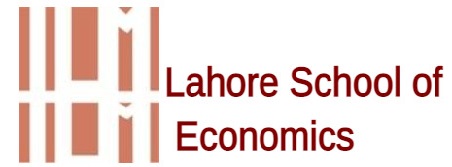MPhil in Economics
Programme Mission:
The MPhil program at Lahore School aims to produce intellectuals, researchers and professionals in the field of economics. The course work should provide analytical training to students through seminars, econometrics workshops and advanced level classroom lectures and should match international standards of academics and research. The year-end dissertations will be aimed to emphasize leading areas of research where students will be required to use latest econometric techniques and methodology to prepare them for the practical field as well as post-graduate degree (PhD).
The MPHIL Economics programme requires completion of 32 credit hours of coursework and an MPhil thesis (6 credit hours). The program is broad enough to offer three specializations (streams) that are especially designed keeping in view the future placement of the students.
- Quantitative Economics
- Development Economics
- Trade and Public Policy
- Data Analytics
The program consists of core courses, specialization courses, electives and brush-up courses to help students to optimally tailor their specialization and course choices according to their learning objectives and professional aspirations. The Quantitative Economics Stream offers strong theoretical and quantitative skills to prepare students for PhD programs. The students graduated with this stream are fully prepared to start a PhD in Economics program at any top university. The Development Economics, and Trade and Public Policy Streams develop applied skills for professional careers with concentration on Micro-development and Macro-development issues, respectively. The students graduated with these streams are fully prepared to take on professional career in central banks, international institutions, government ministries and departments, development sector, and research centers/think tanks.
Core courses (Mandatory for all the streams)
- Mathematical Economics
- Econometrics I
- Theories of Economic Growth
- Decision Theory: Producers and Consumers
Specialization courses
| 1: Quantitative Economics | 2. Development Economics | 3. Trade and Public Policy Stream | |
|---|---|---|---|
|
|
|
|
| First Year | First Year | First Year |
|---|---|---|
| STREAM 1: Quantitative Economics Winter Term: Sept. – Dec |
STREAM 2: Development Economics Winter Term: Sept. – Dec |
STREAM 3: Trade and Public policy Winter Term: Sept. – Dec |
|
|
|
| Spring Term: Jan. – May | Spring Term: Jan. – May | Spring Term: Jan. – May |
|
|
|
| Summer Term : June. – August | Summer Term : June. – August | Summer Term : June. – August |
|
|
|
| Second Year Winter Term: Sept. – Dec |
Second Year Winter Term: Sept. – Dec |
Second Year Winter Term: Sept. – Dec |
|
|
|
| Spring Term: Jan. – May | Spring Term: Jan. – May | Spring Term: Jan. – May |
|
|
|
| CORE COURSES | SPECIALIZATION COURSES | OPTIONAL COURSES |
|---|---|---|
|
Quantitative Economics
|
|
Length of MPhil in Economics Programme and Graduation Requirements: The MPhil in Economics Programme is a 2 to 3-year degree programme requiring completion of 36 credit hours. A CGPA of 3.0 in coursework and an MPhil thesis is required to graduate from the programme.
Credit Hours and Courses: All courses are three credit hours except the MPhil Thesis which is 6 credit hours and course indicated as 2 credit hours.
Semester Schedule: The academic year consists of 2 Semesters (Winter and Spring) and a Summer Term. The Winter Semester from September – December and Spring Semester from January - May consist of 16 -18 weeks each including one week for Mid Semester Exams and one week for Final Semester Exams. The Summer Term will be from June – August for 9- 11 weeks.
Entrance Requirements: Admission to the Lahore School’s MPhil in Economics programme is regulated through (i) HAT 3- Social Sciences/ Lahore School Subject Test for Economics (ii) a Lahore School admissions test (iii) previous academic record (iv) an interview process. Candidates with sixteen years of schooling (subject area economics) or 4 years BSc (Hons) Economics graduates with a minimum CGPA of 3.0 and above are eligible to apply for the MPhil in Economics programme.The application form can be downloaded from this LINK. Submit the application form on an online account at admissions.lahoreschool.edu.pk or through TCS (Courier) at admissions office, 104-C-2. Gulberg III. Lahore.
Post Graduate Diploma (PGD) in Economics: MPhil Students unable to proceed further in the MPhil Programme may be eligible for PGD. The PGD in Economics requires completion of 24 credit hours of MPhil coursework and a CGPA of 2.5.
Transfer to MS in Economics Programme: Students registered in the MPhil in Economics Programme based on their academic performance, may be given an option with the permission of the Dean of the Faculty to transfer to the MS Programme at the end of the second semester.
The Lahore School of Economics has the right to make modifications in its Policies including Admission Policies, Fees, Courses, Course Sequence, Seminar, Tutorial and Graduation requirements for any Undergraduate/ Graduate Programme. The School also reserves the right to prescribe pre-requisite course work to a candidate exclusive of regular coursework for the MS/MPhil/PhD Programme
